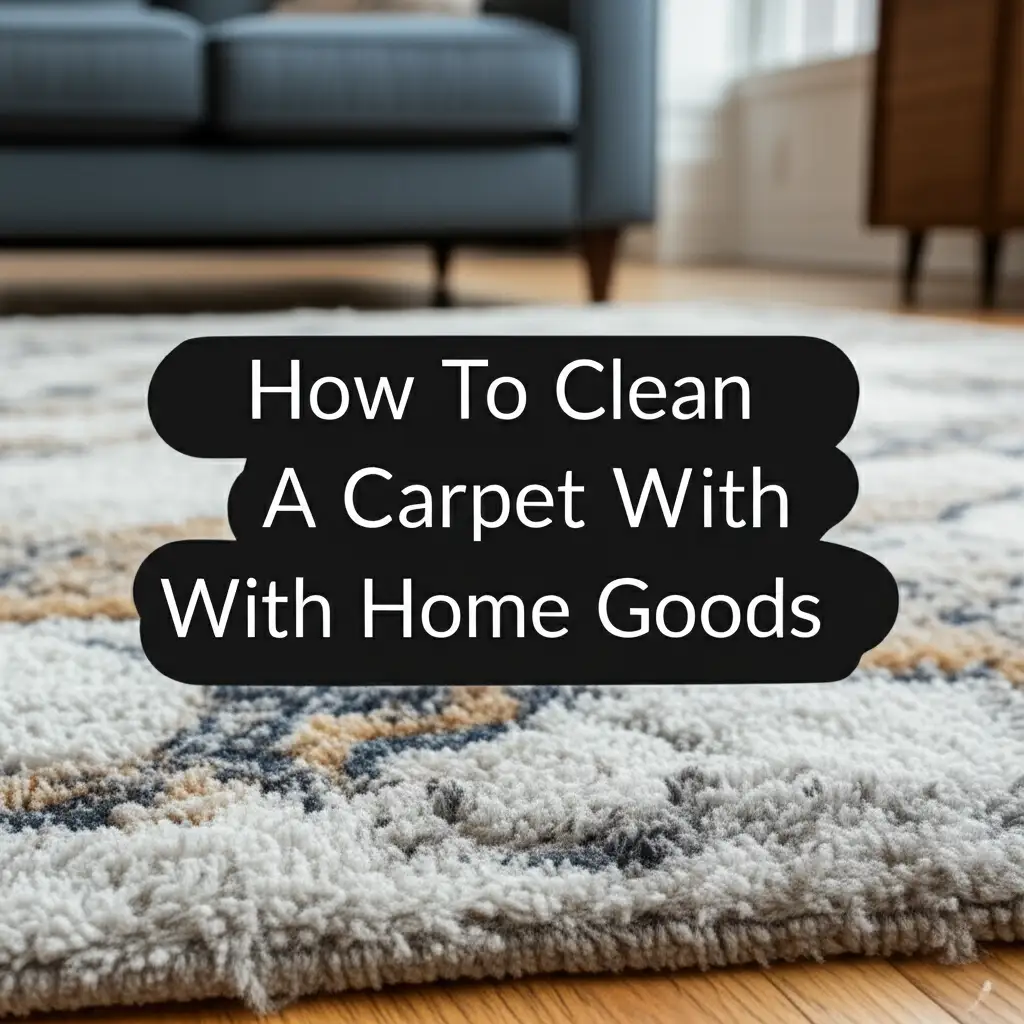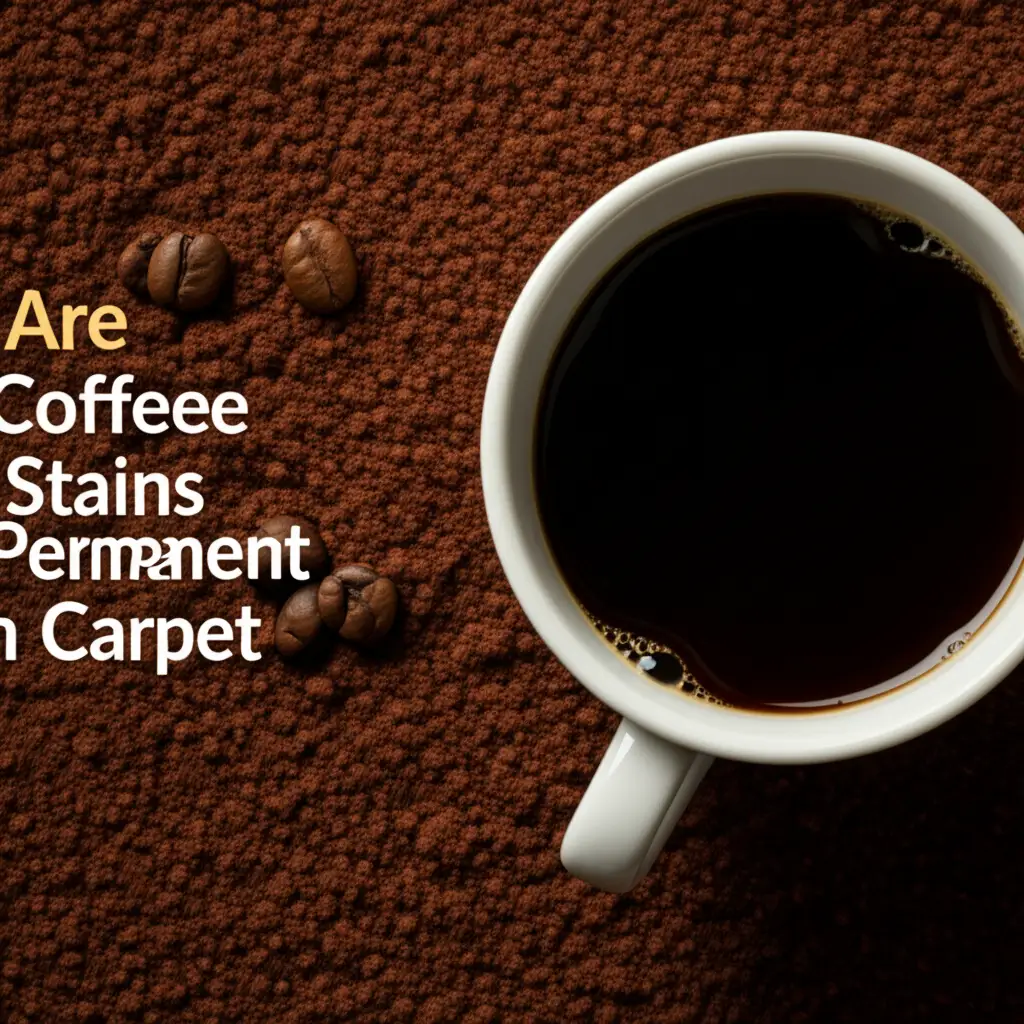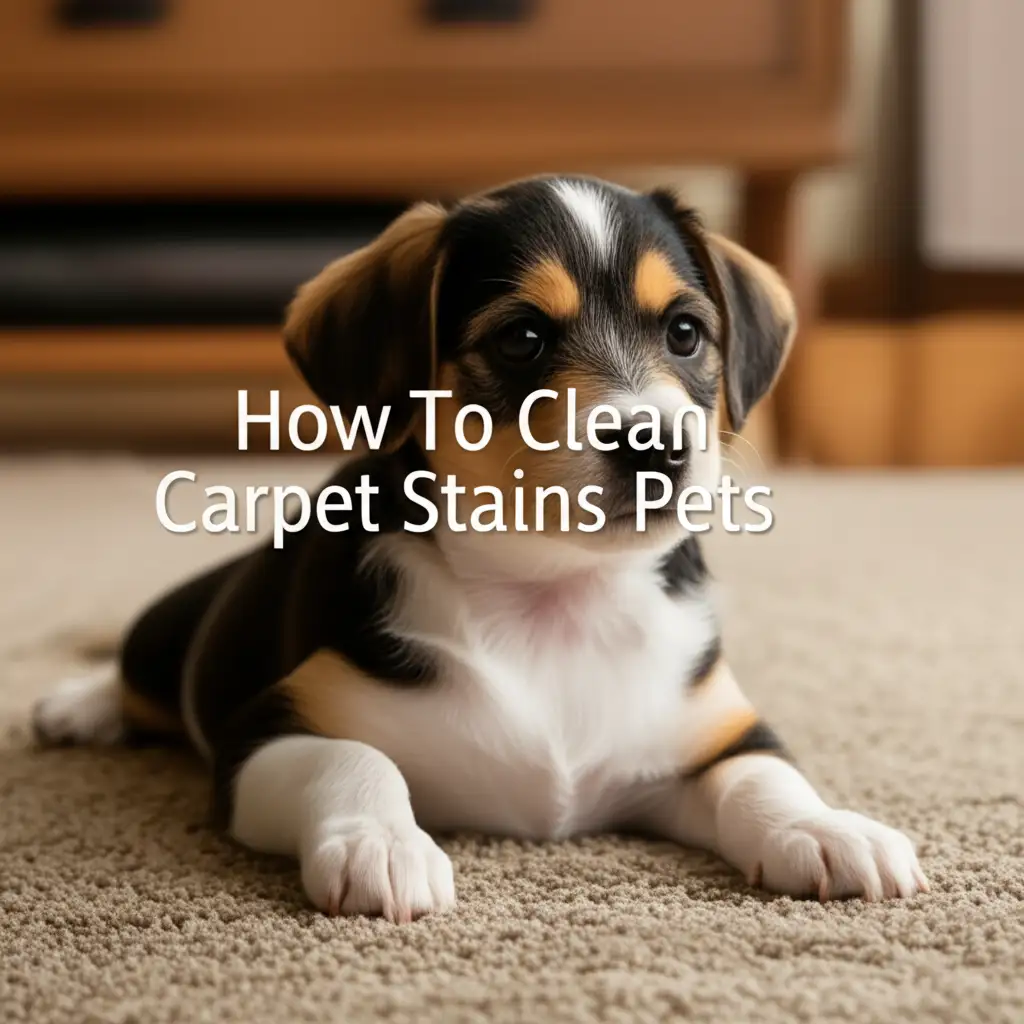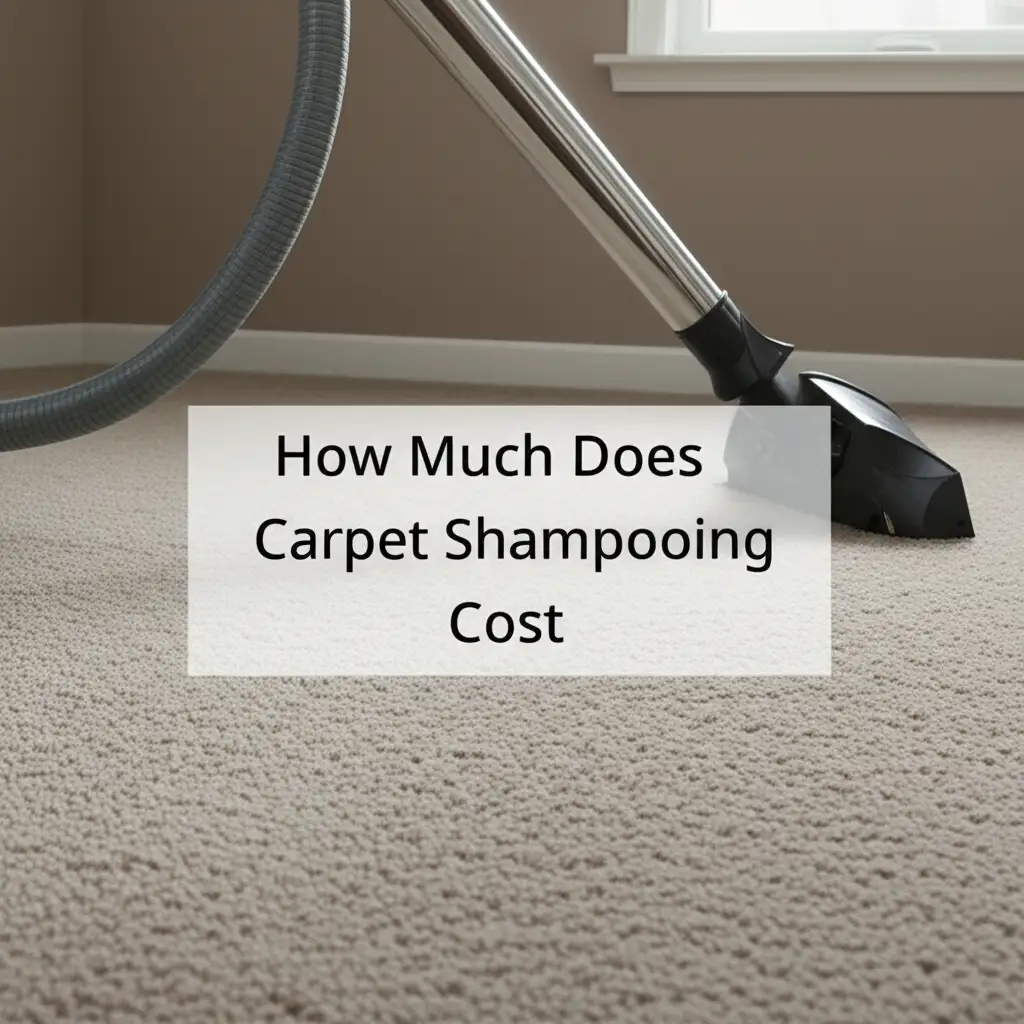· Tessa Winslow · Home Care · 22 min read
Is A Deodorizer Necessary After Carpet Cleaning
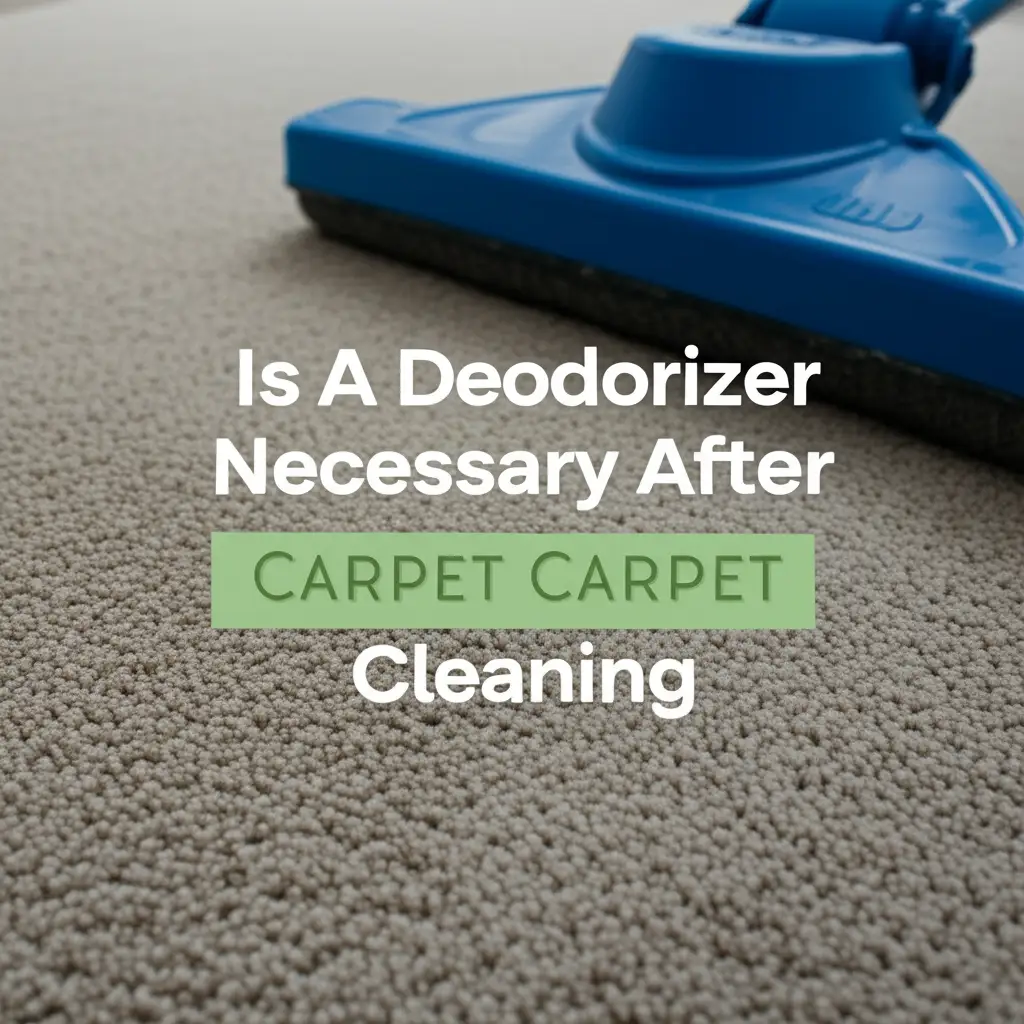
Is a Deodorizer Necessary After Carpet Cleaning for a Fresh Home?
Stepping into a home with clean carpets feels wonderful. We often imagine a fresh, clean scent, but sometimes a lingering odor persists, or even a new, damp smell appears. This makes us wonder: is a deodorizer necessary after carpet cleaning? It is a common question. Many people expect their carpets to smell perfectly clean right after a professional service. However, the reality of carpet odors and cleaning processes is more complex.
This article will explain why odors exist in carpets. We will discuss how deep cleaning methods work to remove them. You will learn when a deodorizer is truly needed. We will cover different types of deodorizers and their effectiveness. I will guide you through DIY options versus professional treatments. Finally, we will explore ways to prevent future odors and recognize signs of underlying issues. You can achieve truly fresh carpets.
Takeaway
- Assess Existing Odors: Determine if your carpet has strong, persistent odors before cleaning, especially from pets or mildew.
- Understand Cleaning Limitations: Standard carpet cleaning removes dirt and some odors, but deep-seated smells might require extra treatment.
- Consider Professional Deodorizers: For severe odors, professional enzymatic or encapsulation deodorizers often provide the best results.
- Ensure Proper Drying: Adequate ventilation and drying after cleaning are crucial to prevent new musty smells or mold growth.
- Maintain Regularly: Vacuum often and address spills immediately to keep carpets fresh between deep cleans.
Do you need a deodorizer after carpet cleaning?
Not always. A deodorizer is necessary after carpet cleaning if strong, deep-set odors like pet urine, mold, or persistent mustiness remain. Professional cleaning often removes surface smells, but specialized deodorizers break down odor sources for a truly fresh, lasting result, especially for older, heavily soiled carpets.
Understanding Carpet Odors Before Cleaning
Carpets are like giant sponges for your home’s air. They trap all sorts of things. These trapped particles can create unwanted smells. It is important to know what causes these odors. Understanding the source helps you decide if a deodorizer is necessary after carpet cleaning.
Many common odors come from everyday life. Pet accidents are a major source of bad smells. Urine soaks into carpet fibers and padding. Bacteria grow there, making strong, lingering ammonia-like odors. Spilled food and drinks also cause smells. Sugary drinks or milk can ferment. This creates a sour odor. If you do not clean up spills quickly and properly, they can turn into permanent smells.
Moisture is another big culprit. High humidity or water leaks can cause mold and mildew to grow. These fungi have a distinct, musty odor. This smell often gets worse when the carpet gets wet. Even in dry climates, if your home has poor ventilation, moisture can build up in carpets. This leads to a stale or damp smell. Everyday dirt and grime also contribute. Over time, dust, skin flakes, and general debris accumulate. This mix creates a dull, stale smell. It is not as strong as pet odors or mold, but it reduces the freshness of your home.
Think about the history of your carpet. Has it seen many spills? Do you have pets? Has there ever been a flood or leak nearby? The answers to these questions will tell you a lot about the potential for deep-seated odors. Surface cleaning might remove visible dirt. However, it often leaves the odor source behind. That is why professional carpet cleaning is so important for odor removal. It addresses the unseen issues.
How Professional Carpet Cleaning Works to Remove Odors
Professional carpet cleaning aims to do more than just make your carpet look clean. It works to truly refresh your carpet. This process tackles dirt, grime, and many odors. When you have your carpets professionally cleaned, they use powerful methods. These methods get deep into the carpet fibers. They lift out trapped contaminants.
One common method is hot water extraction. This is often called steam cleaning. Hot water and cleaning solutions are sprayed onto the carpet. They penetrate deep. This loosens dirt, allergens, and odor-causing particles. Then, a powerful vacuum extracts the water. It pulls out all the dissolved grime. This process flushes out many odor sources. It is effective for general dirt and some mild odors. Understanding how carpet cleaning works can help you appreciate its power.
Pre-treatments are also key for odor removal. Before the main cleaning, special solutions are applied to problem areas. For pet odors, enzymatic cleaners are often used. These cleaners contain enzymes. The enzymes break down organic matter like urine. This neutralizes the odor at its source. Standard detergents just clean the surface. Enzymatic cleaners actually digest the odor-causing bacteria. This makes a big difference for deep pet smells. Other pre-treatments target specific stains or greasy spots. This prepares the carpet for a more thorough clean.
Professional cleaners have strong equipment. Their machines extract much more water than rental units. This reduces drying time. Proper drying is crucial for preventing new odors. If carpets stay wet too long, mold and mildew can grow. This creates a musty smell. A good professional service ensures your carpet dries quickly. They often use high-speed air movers. They also instruct you on keeping good ventilation. This helps prevent moisture-related odors from forming. The goal is a clean, fresh carpet that smells truly neutral. Sometimes, though, odors are so stubborn that extra steps are needed.
When a Deodorizer is Truly Necessary After Carpet Cleaning
Even with excellent professional cleaning, some odors are very stubborn. A deodorizer becomes necessary after carpet cleaning in specific situations. It is not always a standard part of the cleaning. Often, it is an added service for persistent issues. You should consider a deodorizer if certain conditions apply to your carpet.
Severe pet odors are a primary reason. Pet urine soaks deep into the carpet backing and subfloor. The urine crystals and bacteria create very strong, lasting smells. Standard cleaning might remove some of the surface smell. However, the deep-seated source remains. A specialized pet deodorizer or enzyme treatment targets these crystals. It breaks them down and neutralizes the smell. If you have had pets with many accidents, a deodorizer is often essential for a truly fresh outcome. You might be surprised how much smell an old carpet holds. Even if you clean a 10-year-old carpet, deep odors can linger.
Old, neglected stains can also cause persistent odors. Spills of milk, vomit, or other organic matter that sat for a long time can lead to stubborn smells. These organic materials break down over time. They produce unpleasant odors. Even after cleaning, a faint trace might remain. A deodorizer can help eliminate these lingering molecular smells. It addresses what the cleaning process might have missed. These old stains are often more than just a surface issue.
A specific pungent smell might point to a need for deodorizing. This includes odors from smoke damage or cooking smells that have permeated the fibers. Smoke particles are tiny. They embed deeply into porous materials like carpet. A regular cleaning might remove surface smoke residue. However, specialized deodorizers are needed to encapsulate or neutralize the smoke odor at a molecular level. This applies to strong cooking smells too. Curries, fried foods, or certain spices can leave a lasting scent.
Finally, persistent mustiness or a damp smell indicates a problem. This often points to mold or mildew growth. If your carpet had water damage or high humidity for a long time, mold spores might be present. Cleaning removes visible mold and mildew. But if moisture was in the padding or subfloor, the smell can quickly return. This is especially true if water gets into vents from carpet cleaning. A professional deodorizer with antimicrobial properties helps stop this. It targets the root cause of the musty smell. This provides a truly clean and healthy environment.
Types of Deodorizers and Their Effectiveness
When you decide a deodorizer is necessary after carpet cleaning, knowing your options helps. Different types of deodorizers work in different ways. Each has its own level of effectiveness. Choosing the right one depends on the type and severity of the odor you face.
Enzymatic deodorizers are very powerful. They contain special enzymes. These enzymes break down organic matter. This includes urine, vomit, blood, and food spills. The enzymes literally digest the proteins that cause odors. They do not just cover up smells. They eliminate the source. These are highly effective for pet odors. They are also good for other organic stains. Enzymatic cleaners are often sprayed on the affected areas. They need time to work, usually several hours. They are a top choice for deep, lingering biological odors.
Masking deodorizers are simpler. They work by releasing a pleasant scent. This scent covers up bad odors. Think of air fresheners or scented powders. They provide immediate relief. The room smells nice for a while. However, they do not remove the odor source. Once the masking scent fades, the original smell can return. These are good for mild, temporary odors. They are also useful for adding a fresh finish after cleaning. However, for stubborn smells like pet urine or mold, they are not a permanent solution. Companies might use carpet powder. You might wonder will a cleaning company vacuum carpet powder after applying it. They usually do after it sits.
Absorbent powders are another option. These powders, like baking soda or activated charcoal, soak up odors. They pull odor molecules out of the carpet fibers. You sprinkle the powder on the carpet. You let it sit for a few hours. Then you vacuum it up. Baking soda is a popular DIY choice. It is safe and effective for mild odors. Activated charcoal is stronger. It can absorb a wider range of smells. These methods work best for general stale smells or light pet odors. They are not powerful enough for severe, deep-set smells. They do not neutralize the source. They just absorb the molecules.
Odor encapsulators are advanced chemical deodorizers. They trap and neutralize odor molecules. They work by binding to the odor particles. This makes them harmless. These are often used by professionals. They are effective for a wide range of odors. This includes smoke, pet, and general musty smells. Encapsulators dry into a powder or crystal. This locks the odor away. They provide a more permanent solution than masking agents. Each type has its place. The best choice often depends on the specific odor challenge.
DIY Deodorizing vs. Professional Deodorizing Treatments
Deciding between doing it yourself or hiring a professional for deodorizing after carpet cleaning depends on several factors. Consider the severity of the odor. Also, think about your comfort with cleaning tasks. Both options have their benefits and drawbacks. Knowing when to choose which path helps you achieve the best results.
DIY deodorizing can be effective for minor odor issues. If your carpet has a slight stale smell, or a small, recent pet accident, you can try home remedies. Baking soda is a fantastic, natural deodorizer. Sprinkle a generous amount over the affected area or the entire carpet. Let it sit for several hours, or even overnight. Then vacuum it thoroughly. This absorbs light odors. White vinegar diluted with water can also neutralize some odors. Spray a fine mist onto the carpet. Do not saturate it. Allow it to air dry. Vinegar’s smell dissipates as it dries. You can also buy consumer-grade enzymatic cleaners from stores. These are good for fresh pet stains. Follow the product instructions carefully. Ensure good ventilation when using any DIY products.
However, professional deodorizing treatments are often necessary after carpet cleaning for severe or deep-seated odors. Professionals have access to stronger, specialized products. They use industrial-grade equipment. For example, severe pet urine odors often require saturation. This means applying a deodorizer that soaks through the carpet, padding, and sometimes even the subfloor. Professionals can properly assess the extent of the contamination. They apply the correct amount of product. Their powerful extraction machines remove the residue efficiently. This prevents new problems. They also know how to apply antimicrobial treatments for mold and mildew. This prevents recurrence.
The type of carpet also plays a role. Some delicate carpets, like wool, require specific products. Professional cleaners understand these nuances. They ensure the deodorizer does not damage the carpet fibers. They also have tools to measure moisture levels. This prevents overwetting. DIY efforts can sometimes lead to overwetting. This can cause mold growth. This would make the odor worse. It could even damage the carpet structure.
In summary, DIY methods are great for maintenance and mild odors. For serious, pervasive smells like old pet accidents, smoke, or persistent mold, professional deodorizing is superior. It offers a more thorough and lasting solution. It also protects your carpet from damage. Consider calling a professional cleaner if your carpet still smells bad after basic cleaning. They can diagnose the problem. They will offer the right treatment.
Preventing Odors After Cleaning
Getting your carpets clean is a great step. But the work is not over. Preventing new odors from forming is crucial. This ensures your carpet stays fresh for a long time. There are several simple steps you can take. These steps complement the professional cleaning process.
First, proper drying is the most important step after carpet cleaning. If carpets stay wet for too long, mold and mildew can grow. This creates a strong, musty odor. Professional cleaners use powerful vacuums. They remove most of the water. However, you need to help finish the job. After cleaning, open windows and doors. Use fans or air movers. Turn on your air conditioning or heating system. This circulates air. It lowers humidity. Aim for the carpet to be dry within 6-12 hours. Never put furniture back on damp carpet. This traps moisture. It can lead to mold or stains. If you suspect water in vents from carpet cleaning can grow mold, address it immediately. This prevents a lingering musty smell.
Regular maintenance is key. Vacuum your carpets frequently. This removes dirt, dust, and pet dander. These particles can contribute to stale odors over time. Aim to vacuum at least once or twice a week. Use a vacuum with strong suction and a good filter. This traps more allergens and dirt. High-traffic areas might need daily vacuuming. Regular vacuuming prevents buildup. It helps keep your carpet smelling fresh between deep cleans. This also extends the life of your carpet.
Address spills immediately. Accidents happen. But quick action prevents them from turning into permanent odors. Blot spills with a clean white cloth. Work from the outside in. Do not rub the stain. This spreads it and pushes it deeper. For liquid spills, use paper towels. Press firmly. Repeat until no more liquid comes up. For specific stains like pet accidents, use an appropriate cleaner. Blot, do not scrub. Prompt cleaning removes the source of the odor. This keeps it from penetrating the carpet padding. This also prevents bacteria growth.
Control humidity in your home. High humidity creates an ideal environment for mold and mildew. These cause musty odors. Use a dehumidifier in damp areas. Ensure your home has proper ventilation. This is especially important in bathrooms and kitchens. Use exhaust fans when showering or cooking. Maintaining a humidity level below 60% helps. This prevents moisture from getting trapped in your carpets. These simple practices significantly reduce the chances of needing a deodorizer again soon. They keep your home smelling clean and fresh.
Recognizing Lingering Odors and What They Mean
After your carpet has been professionally cleaned, you expect it to smell clean. Sometimes, a smell persists. Or, a new, unfamiliar odor might appear. Recognizing what these lingering odors mean is important. It helps you decide if further action is needed. Not all post-cleaning smells are bad. Some are temporary. Others signal a deeper problem.
A “wet carpet smell” is common immediately after cleaning. This smell is often harmless. It usually fades as the carpet dries completely. It is a damp, earthy smell. It comes from the cleaning solution and the moisture itself. It might also come from disturbed dirt particles. This smell should disappear within 24-48 hours. If the carpet is drying properly, this smell will go away. Do not confuse this with a musty or moldy smell. A musty smell indicates something more serious.
A truly persistent odor after the carpet dries suggests a problem. If you still smell pet urine, mildew, or a stale odor days after cleaning, there is an underlying issue. This means the original odor source was not fully removed. It could be due to deep saturation into the padding or subfloor. This happens with severe pet accidents. Or, it could be mold that has penetrated beyond the carpet fibers. In these cases, a standard cleaning might not be enough. This is when a deodorizer is necessary after carpet cleaning. You need a targeted approach.
A musty or moldy smell is a red flag. This indicates fungal growth. If your carpet smells like a damp basement, it is likely mold or mildew. This can happen if the carpet did not dry quickly enough. It can also happen if there was pre-existing moisture. Mold thrives in damp, dark environments. It can grow in the carpet backing or padding. Not only is this odor unpleasant, but mold can also impact air quality. It can cause health issues. If you detect this smell, act quickly. You need to identify the moisture source and address it. Then, you need a powerful antimicrobial deodorizer.
A “sour” smell often indicates organic matter. This could be old milk, vomit, or food spills. Even after cleaning, some residue might remain. This residue ferments over time. This causes a sour odor. This requires an enzymatic cleaner. It breaks down the organic compounds. These smells are often tricky. They hide deep in the fibers. It is important to identify the exact source. Then, you can apply the correct treatment. Do not ignore these smells. Lingering odors mean the carpet is not truly clean. They signal that further specialized treatment is needed for a healthy home environment.
The Importance of Ventilation During and After Cleaning
Ventilation is a silent hero in carpet cleaning. It plays a critical role. Good airflow ensures a successful cleaning outcome. It also helps prevent new odors from forming. Many people focus on the cleaning solution or machine. But proper ventilation is just as vital. It significantly impacts how fresh your carpet feels after the job is done.
During the carpet cleaning process, ventilation helps manage humidity. Hot water extraction introduces moisture into your carpet. If this moisture lingers, it creates a breeding ground for mold and mildew. These fungi cause unpleasant musty smells. Opening windows and doors creates cross-ventilation. This allows humid air to escape. It also brings in drier outside air. This helps the carpet dry faster. Professional cleaners often use powerful air movers or fans. These tools circulate air directly over the cleaned areas. This dramatically speeds up drying time. This faster drying is key to preventing moisture-related odors.
After the cleaning is complete, continued ventilation is essential. Your carpet might feel dry to the touch on the surface. However, moisture can still be deep within the padding or backing. This hidden moisture can lead to problems if trapped. Keep windows slightly ajar for at least 24 hours after cleaning. Run ceiling fans. Use portable fans. If you have an HVAC system, run the fan setting. This ensures constant air circulation. It helps evaporate any remaining moisture. This also helps any cleaning solution residues dry completely.
Good ventilation also dissipates any temporary cleaning solution odors. Some cleaning products have a distinct smell. This smell is usually harmless. It fades as the carpet dries. Good airflow speeds up this fading process. It leaves behind a neutral, fresh scent. Without proper ventilation, these temporary smells can linger. They can sometimes be mistaken for an unresolved odor problem.
Poor ventilation can cause more than just musty smells. It can lead to mold growth. Mold can damage your carpet fibers and the subfloor. It can also cause health problems for sensitive individuals. Preventing mold is easier than treating it. Ensuring excellent ventilation is your first line of defense. So, before your next carpet cleaning, plan for good airflow. Open those windows. Get your fans ready. This simple step protects your investment. It ensures your home smells truly clean and fresh.
When to Call a Professional for Odor Elimination
Sometimes, despite your best efforts, a stubborn odor persists. This is when it is time to call a professional for odor elimination. While general carpet cleaning removes many smells, some odors require specialized expertise and equipment. Knowing when to escalate from DIY efforts to professional intervention saves you time, money, and frustration.
Deep pet urine saturation is a primary reason to call professionals. If your pet had repeated accidents in the same spot, the urine likely soaked through the carpet and padding into the subfloor. This creates a large, complex odor source. Regular cleaning or surface-level deodorizers will not reach it. Professional cleaners have specialized tools. They use moisture meters to pinpoint the exact affected areas. They can often lift the carpet to treat the subfloor directly. They use powerful enzymatic treatments. These treatments break down the urine crystals completely. This neutralizes the odor at its source. This deep treatment is often the only way to permanently remove severe pet odors.
Mold and mildew problems also demand professional attention. If you detect a persistent musty smell, it likely indicates mold or mildew growth. This can happen from water damage, leaks, or prolonged high humidity. Mold spores are microscopic. They can spread quickly. A professional cleaner can assess the extent of the mold. They use strong antimicrobial solutions. They treat the carpet, padding, and surrounding areas. They also use industrial-strength drying equipment. This ensures complete moisture removal. Attempting to clean significant mold yourself can be risky. It can spread spores. It might not fully eliminate the problem. Professionals have the right protective gear and knowledge.
Lingering smoke odors are another challenge for professionals. Whether from cigarettes, a fireplace issue, or a small fire, smoke particles embed deeply into carpet fibers. They are very difficult to remove with standard cleaning. Professionals use specific techniques. This includes ozone treatments or encapsulation deodorizers. These methods neutralize smoke odors at a molecular level. They do not just mask the smell. This is crucial for truly fresh air quality after smoke exposure.
Finally, if you have tried various DIY solutions without success, it is a clear sign. You might have wasted time and money on products that are not strong enough. Or, you might not have identified the true source of the odor. Professional cleaners have the experience to diagnose tricky odor problems. They have access to a wider range of solutions and powerful equipment. They can save your carpet. They can restore fresh air to your home. Do not hesitate to consult them when faced with a persistent, unpleasant smell. Your home’s air quality is worth the investment.
Frequently Asked Questions
Can a clean carpet still smell bad?
Yes, a clean carpet can still smell bad. This often happens if the odor source, like pet urine or mold, soaked deep into the carpet padding or subfloor. While the surface might be clean, the hidden odor source remains active. Lingering dampness after cleaning can also cause a temporary musty smell until the carpet fully dries.
How do I get rid of a musty smell after carpet cleaning?
To get rid of a musty smell after carpet cleaning, ensure the carpet dries completely. Use fans, open windows, and run a dehumidifier. If the smell persists after drying, it indicates mold or mildew. You may need a professional application of an antimicrobial and deodorizing treatment to eliminate the fungus and its odor source.
What kind of deodorizer is best for pet odors?
Enzymatic deodorizers are best for pet odors. These cleaners contain enzymes that break down the organic compounds in urine, vomit, and other pet accidents. They neutralize the odor at its source, rather than just masking it. Apply them directly to the affected areas. Allow sufficient time for the enzymes to work.
How long does the “wet carpet” smell last?
The “wet carpet” smell usually lasts 24 to 48 hours after cleaning. This temporary damp odor is normal. It should dissipate as the carpet completely dries. Good ventilation, using fans, and maintaining air circulation can help speed up the drying process and eliminate this smell faster.
Is professional deodorizing safe for pets and children?
Professional deodorizing products are generally safe for pets and children once dry. Reputable carpet cleaning companies use professional-grade, non-toxic, or low-toxicity solutions. Always ask your cleaner about the specific products they use. Ensure proper ventilation during and after application. Keep pets and children away until the carpet is fully dry.
Can old carpets ever be truly odor-free?
Yes, old carpets can often be truly odor-free with the right treatment. While old carpets accumulate many odors over time, professional deep cleaning combined with specialized deodorizers can break down and remove most stubborn smells. Severe cases, especially with extensive pet damage, might require replacing the padding or treating the subfloor for complete odor elimination.
Conclusion
Deciding if a deodorizer is necessary after carpet cleaning depends on your carpet’s history and the nature of any lingering smells. While a good professional cleaning often removes general dirt and surface odors, deep-seated issues like severe pet urine, hidden mold, or ingrained smoke particles require more targeted treatment. It is not always about whether a deodorizer is necessary after carpet cleaning, but rather when it is absolutely vital for true freshness.
We explored how professional methods like hot water extraction tackle odors. We also highlighted the specific situations where a deodorizer becomes essential. Knowing the difference between masking agents and enzymatic solutions helps you make informed choices. Proper ventilation and immediate spill cleanup are


